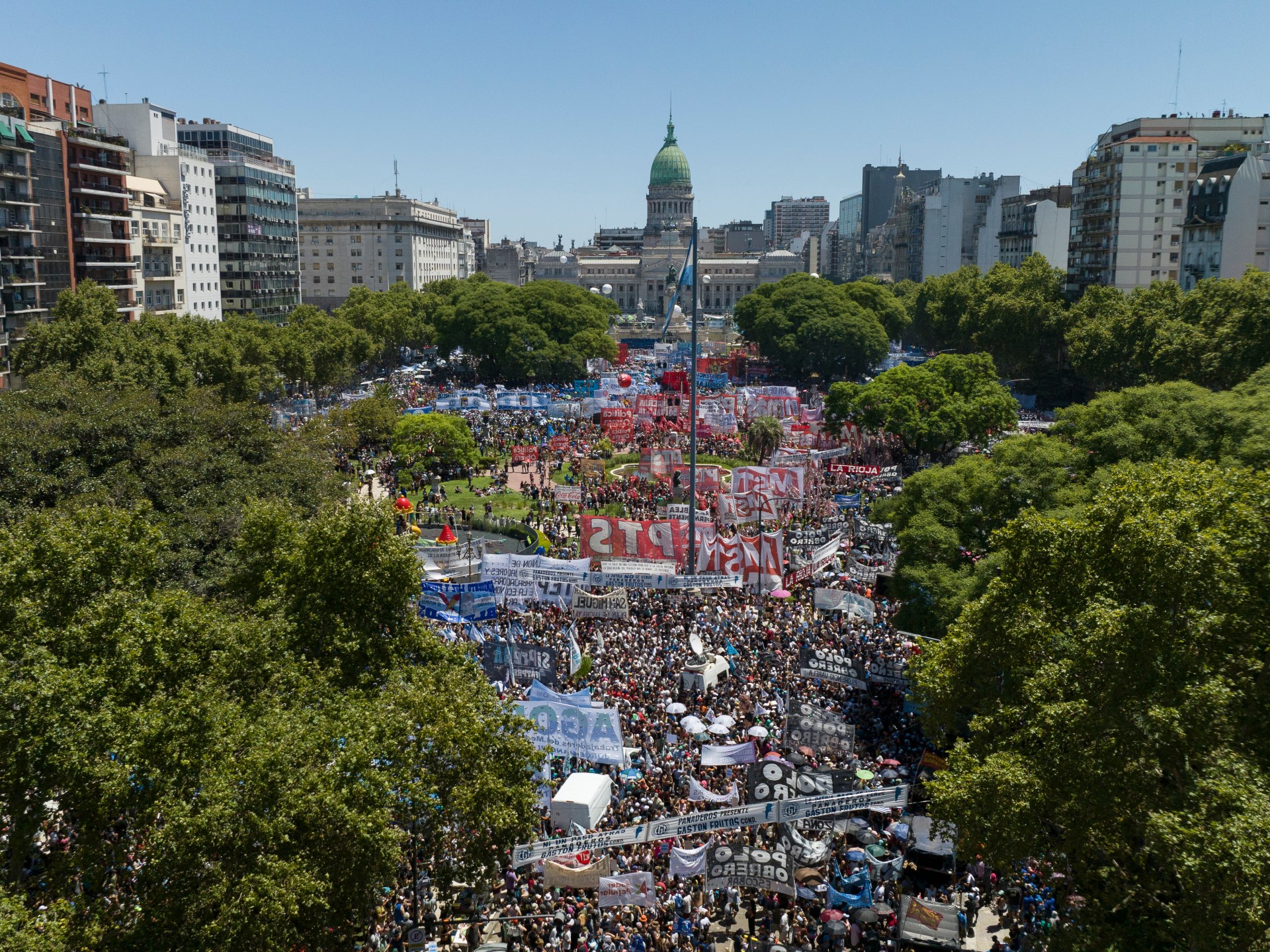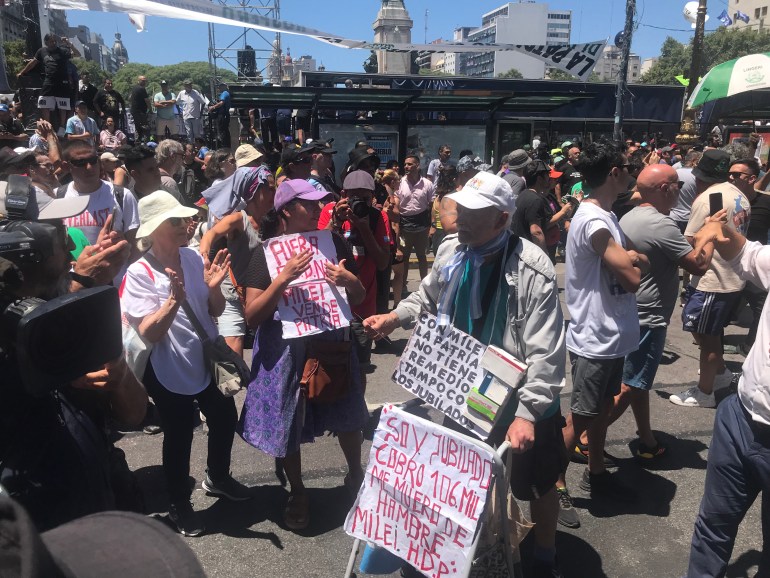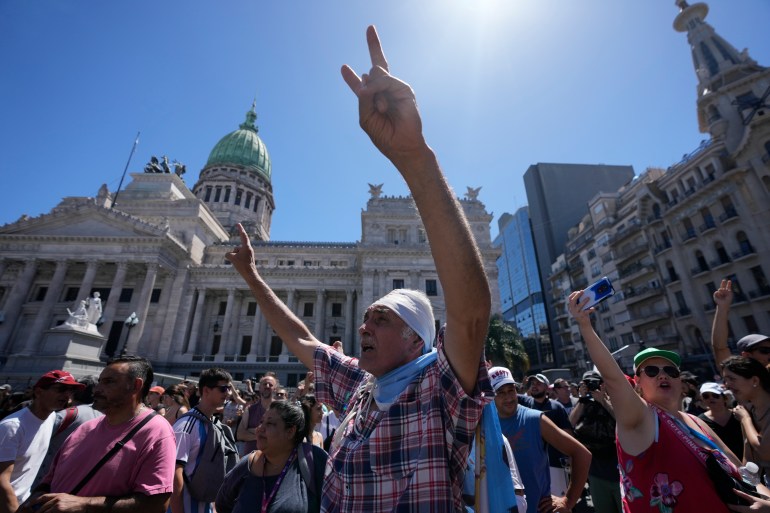
Buenos Aires, Argentina – In the largest demonstration of resistance against right-wing extremists to date President Javier MileiIn 2017, Argentine workers took to the streets in a general strike, bringing large parts of downtown Buenos Aires to a standstill.
It was an unprecedented mobilization. Never before in modern Argentine history has a mass strike been called less than seven weeks into a new presidency.
But leaders of Argentina’s largest union say the nationwide protests reflect the urgency they feel as Milei pushes for radical economic and political reforms that he calls “Shock therapy“.
Thousands of demonstrators flocked to the square in front of Argentina’s Congress on Wednesday and condemned Milei’s behavior comprehensive plans to reform the government, privatize public industries and cut spending.
Some banged pots and carried signs accusing Milei of being a “traitor.” Other banners featured a portrait of a working-class icon Evita Peron.
Elizabeth Gutierrez made her way to the meeting after working a night shift as a nurse. She explained that she was motivated by the sharp increase in food prices since Milei took office.
“There used to be asados [barbecues] every Sunday. Not now. Even rice is very expensive,” Gutierrez said. “Rents have skyrocketed. You can no longer live on your salary: it’s not enough.”
“The people are here to defend their nation,” she added.
Another protester, 63-year-old retiree Alicia Pereyra, spoke out against Milei’s efforts deregulate the economy, including plans to “modernize” labor laws and abolish rent regulation. “He wants us to be slaves,” Pereyra said.
Wrapped in an Argentine flag, Pereyra worried about her ability to make ends meet in the face of Milei’s reforms. Your retirement income is only 85,000 pesos per month – about $70.
She said basic needs have become so costly under Milei that she’s not sure she’ll have access to the medications she needs for a chronic illness.
Even small luxuries are now out of reach. Pereyra described how she and her husband chose orange juice instead of wine to toast the New Year 2024, breaking a long-standing family tradition.
“It’s a terrible feeling not knowing what will happen tomorrow,” she said. “[Milei] turns our heads.”

Extreme measures exacerbate extreme inflation
Argentina had already suffered from records Triple-digit inflation when Milei took office on December 10th.
Chosen Promising that he would fix the failing economy, Milei quickly initiated the implementation of austerity measures that he said were necessary to fix Argentina’s finances.
In his Speech for the inauguration, he warned the country that Argentina’s situation would get worse before it got better. And he was right.
One of his first actions was to devalue the Argentine peso by 54 percent, which accelerated already sky-high inflation rates.
According to the National Institute of Statistics and Censuses (INDEC), Argentina ended 2023 with an annual inflation rate of 211.4 percent, the highest rate in Latin America, even surpassing Venezuela.
The year also saw the fastest rise in inflation since 1990, leading to higher prices for consumers.
Santiago Manoukian, chief economist at consultancy Ecolatina, told Al Jazeera that December’s price increases will continue to weigh on consumers’ wallets in the coming months. It will be difficult to keep up with salaries.
“We believe real wages fell more in December than in any other month since at least 2002,” he said. “Purchasing power will continue to decline.”
This trend is expected to slow consumer spending, which Manoukian said will likely lead to a recession and an increase in unemployment and poverty. According to national data, four in 10 Argentines were already living in poverty when Milei took office.

Omnibus bill heads to Congress amid strike
Milei coupled his currency devaluation measure with immediate cuts in government spending, including consumer subsidies.
A presidential “mega-decree” in December reformed or repealed dozens of laws and paved the way for the privatization of state-owned companies. Another decree eliminated 5,000 government jobs.
But more changes are ahead. Wednesday’s nationwide strike comes as Congress prepares to consider a scaled-down version of Milei’s “omnibus bill” the next day.
The bill, which originally included 664 articles, aimed to overhaul the country’s elections, restructure the lower chamber of Congress and impose tough new restrictions on protests, including through penalties of up to six years in prison.
The optimized version is still huge with over 500 items. If passed, it would give Milei’s executive branch broad legislative powers for an “emergency” period of one year.
Still, the president dismissed Wednesday’s strike as evidence of backward thinking. “There are two Argentines,” he told local media. “You want to stay back in the past, in decadence.”
Members of his government also attacked the demonstrators. On Wednesday, Security Minister Patricia Bullrich – Milei’s former rival in the election campaign – called the union groups that organized the strike “gangsters” and “guarantors of poverty.”
“There is no strike that can stop us,” she wrote on X, the social media platform formerly known as Twitter.

Expert compares Milei to a “mini Trump”
Federico Finchelstein, a New York-based historian and researcher on fascism, said Milei’s first month in office showed that he “authoritarian style of populism”.
He drew parallels with Donald Trump, the controversial – but popular – former president of the United States, who sought to claim sweeping executive power during his time in office. Finchelstein compared Milei to a “mini-Trump.”
“It’s a type of populism that aims to undermine democratic institutions,” Finchelstein said.
But despite the criticism and protests He faces Milei continuing to enjoy widespread support among Argentines.
A survey conducted this month by polling firm Escenarios found that 55 percent of respondents believed Milei’s reform measures were necessary to improve the economy.
Political scientist Federico Zapata, general director of Escenarios, attributes these poll numbers to the president’s successful message to voters.
“In some ways, Milei and the libertarians seem to have won the culture war,” he explained. “They managed to reach a consensus on the diagnosis [economic] crisis, and that helps create agreement for the measures.”
Zapata added that Milei also managed to attribute the economic spiral to his left-wing predecessor Ex President Alberto Fernandez.
“He says the economic problems are entirely the responsibility of the previous government. Based on that, he lowered expectations so that people would stay with him longer than the normal honeymoon period,” Zapata said.

Still, Escenarios’ poll found that a majority of respondents believed major policy changes should occur gradually rather than all at once.
And Milei could face further challenges to his reforms beyond Wednesday’s large-scale protests.
A top Argentine court has already invalidated a key part of its “mega-decree,” which sought to repeal a variety of worker protections. Both Gutierrez and Pereyra suggested that opposition to Milei could grow to the point where he will no longer be able to complete his term.
“The government could find itself in the eye of the storm in just a few months,” Zapata said.
But Milei’s supporters remain optimistic that the fiery president will make good on his campaign promises.
Luis Testa, a taxi driver who voted for Milei, said he still supports the president even as he cuts his current spending.
“We have to give him a chance. Let’s give him a year,” Testa said. “And if we all have to eat beans for a year, then we’ll eat beans.”






Recent Comments